Summary: Robotic Process Automation (RPA) tools are becoming increasingly popular in today’s business world. These tools are an asset for businesses looking to streamline their processes and increase efficiency. You can now discover some of the best open-source RPA tools that can help businesses achieve better productivity and ROI.
Automation is everywhere, and in today’s fast-paced digital world, businesses are constantly looking for ways to automate their processes and increase efficiency. Robotic Process Automation (RPA) has emerged as a popular solution for organizations to automate repetitive tasks and free up valuable human resources.
Mainly, businesses are looking for open-source RPA tools because of their cost-effectiveness and flexibility. These tools allow businesses to modify and customize automation workflows for their specific needs, which is not possible with proprietary software.
With that said, let’s look at the top open source RPA tools that can help achieve your automation goals without breaking the bank.
What Is an Open Source RPA Automation Tool?
Open source RPA tools are automation software that are available to the public for free. These tools help businesses to automate boring and repetitive tasks such as data entry and document processing without purchasing any proprietary tools.
RPA tools provide a variety of features, including user-friendly graphical interfaces, drag-and-drop programming, and support for multiple programming languages. These tools can also save money while still providing robust automation capabilities.
In addition, these tools are often more flexible than proprietary solutions since they can be customized to fit specific needs.
Best 7 Open Source RPA Tools Example List
- Robot Framework
- Robocorp
- UI.Vision
- Open RPA
- TagUI
- Taskt
- Automagica
RPA technology helps organizations reduce errors, increase efficiency, and saves time and money. Today, there are many RPA automation tools for businesses to automate their operations. Let’s discuss the seven best RPA automation tools.
1. Robot Framework
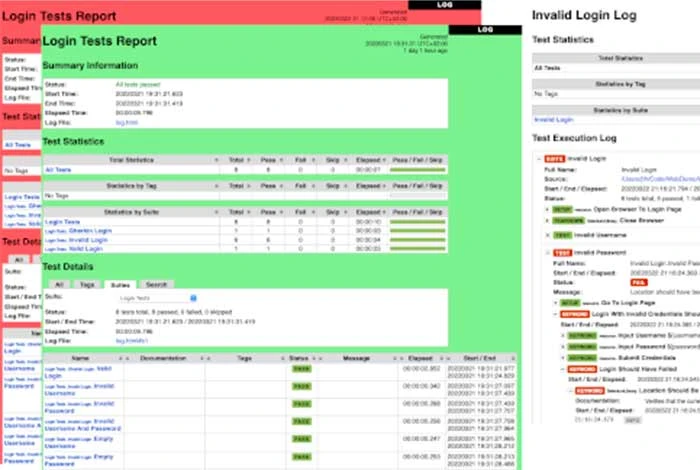
Supported by Robot Framework Foundation, Robot Framework is an open source automation tool. It is widely used by industry-leading companies for test automation and robotic process automation (RPA).
It has an easy-to-use syntax and a library which is implemented with python, Java, and many other programming languages. This tool is free to use and caters to some big companies like Cisco, Nokia, Kone, etc.
Features of Robot Framework:
- Supports data-driven tests for different data sets2
- Creates high-level reusable keywords from the existing ones
- Built-in variable support for testing in multiple environments
- Offers Python-native API for custom test library creation
- Offers setup and teardown for test cases and suites
2. Robocorp
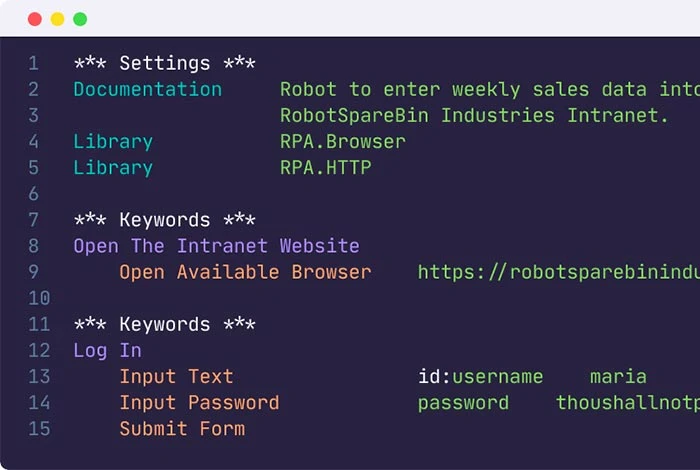
Robocorp’s Open Source Gen2 RPA is built for developers and teams that want to work smarter, not harder. With consumption-based pricing and compatibility with all your favorite tools and languages, you can save around 80% of costs compared to traditional RPA tools.
This RPA tool is built on Python, which helps with quick deployment and maintenance of complex automation.
Features of Robocorp:
- Compatible with various tools and languages like VSC, GitHub, Python, etc.
- Visualize, Monitor and manage your automation on a single dashboard
- Lightning-fast bot deployment with a dedicated Control Room
- Cloud-based deployment for easy access
3. UI.Vision
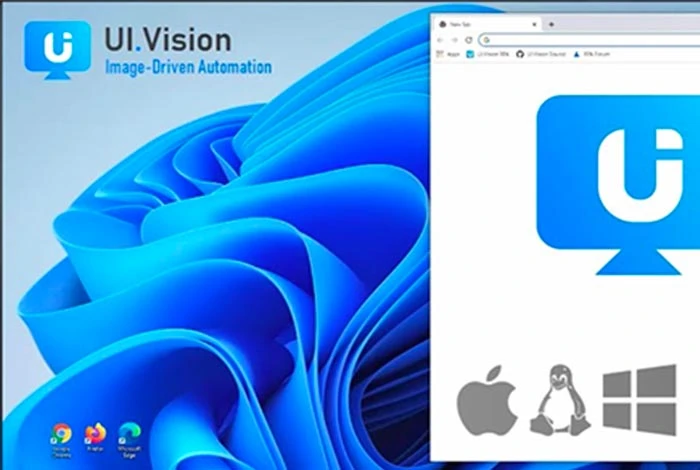
UI.Vision RPA (Formerly Kantu) is a versatile and secure browser extension that offers web and desktop automation across different operating systems (Windows, Mac and Linux). It is an open-source tool allowing users to automate desktop tasks.
Its visual UI testing and browser automation commands enable web designers and developers to verify and validate websites and canvas elements, including images, videos, and texts.
Features of UI.Vision:
- Supports desktop and browser automation
- Automated file uploads/downloads
- Data-driven assessment using CSV files
- Hybrid automation of the web with Selenium IDE++
- Offers enterprise-grade security
4. Open RPA
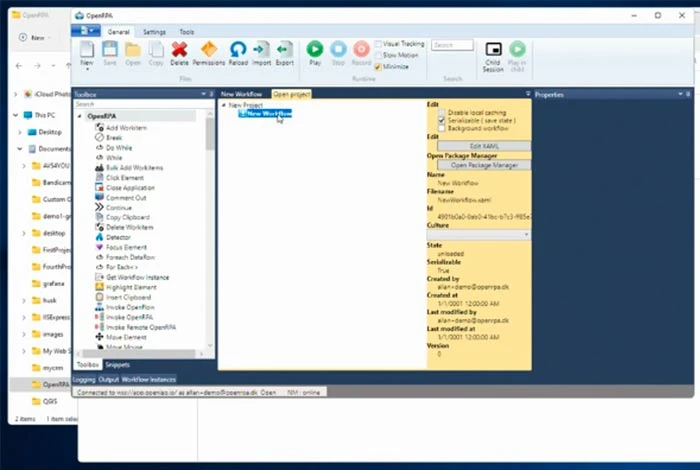
Open RPA is a user-friendly and free RPA tool that offers a drag-and-drop interface for easy manipulation of workflows. This tool was designed using a microservice architecture, making it highly scalable and flexible.
Open RPA also supports scheduling, remote management, and central management with OpenFlow, which enhances its efficiency and performance. These features make Open RPA an efficient and convenient tool for automating repetitive tasks.
Features of Open RPA:
- Supports HD robots for scalable and automated robotics
- Supports a variety of languages such as Python, Go, JavaScript, etc.
- Easily scales up and down as per the server
- Can run independently or with OpenIAP integration
- Fully controllable with NodeRED or PowerShell
5. TagUI
TagUI is a software that helps users automate repetitive or time-sensitive tasks through Robotic Process Automation (RPA). This open-source software was developed by AI Singapore and the community to assist with process automation, data acquisition, and web app testing.
The purpose of UI automation is to replicate human-computer interactions, enabling the computer to perform tasks based on user-defined conditions. Moreover, TagUI is a cross-platform software, as it is available on Windows, Linux and Mac OS.
Features of TagUI:
- Writes scripts in more than 20 languages, including Japanese, Chinese, and English
- Python and R integration for machine learning or artificial intelligence
- Supports web and desktop automation
- No advanced coding language needed
- Creates scripts with a syntax natural language
6. Taskt (Formerly-SharpRPA)
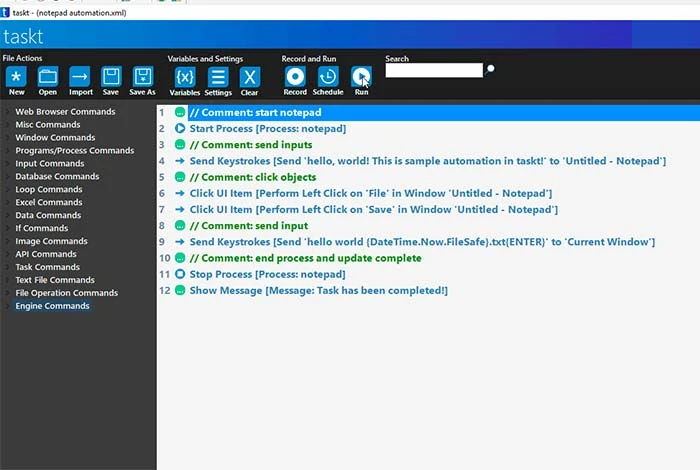
Taskt is a powerful and user-friendly open-source RPA tool that allows developers and businesses to automate repetitive tasks on Windows-based systems. With its drag-and-drop interface, multiple language support, third-party integration, and image and text recognition capabilities.
Taskt is a cost-effective and efficient solution for businesses of all sizes looking to automate their workflows. Its open-source nature also makes it highly customizable to suit specific business needs.
Features of Taskt:
- Offers both web applications and desktop automation
- Supports various programming languages like C#, VB.net, and Python
- Easy integration with third-party apps like Outlook, Excel, etc.
- Offers text and image recognition capabilities
7. Liberty RPA – Formerly Known as Automagica
Liberty RPA by Netcall is an AI-powered RPA tool that frees people from repetitive and mundane tasks such as filling forms, extracting data from various files and folders, creating daily reports, etc.
This software enables tasks to be completed faster, with laser-focused accuracy and within a controlled environment that ensures data security and compliance. Liberty RPA provides unparalleled scalability and has various key features, such as RPA Studio, central management, and intelligent automation.
Features of Liberty RPA:
- Offers low-code automation at scale
- NLP (Natural Language Processing) and AI powered platform
- Helps manage flows, apps, jobs, and everything from Liberty RPA Controller room
- Automates the on-screen process with ease
- Detects handwritten texts
How Does RPA Work?
Robotic Process Automation (RPA) tools work by automating repetitive tasks through software robots. These robots can mimic human actions like keyboard strokes, mouse clicks, and data entry. These tools can perform tasks across multiple systems and applications.
RPA tools use pre-defined rules and algorithms to carry out specific actions. This enables organizations to achieve greater efficiency and accuracy in their operations and frees up employees to focus on higher-value tasks.
Different Types of RPA Tools
There are 3 types of RPA tools which includes:
- Macros: Macros is one of the oldest automation tools and is ideal for automating simple processes that only require one tool, such as a spreadsheet. Macros can perform tasks like organizing data and making calculations to streamline your workflow.
- IT PA (Process Automation): IT Process Automation (IT PA) tools are designed to automate complex processes that are dependent on multiple systems. These tools are function-specific and can handle tasks like receiving alerts from various sources, prioritizing action plans, and deploying one of the defined possible action plans. IT professionals need to supervise these bots.
- Cognitive Tools: These tools have screen scraping features that enable them to simulate human behavior on a desktop. It helps in completing complex tasks that involve multiple systems.
While these bots may not be as accurate as ITPA tools, they are user-friendly and can be easily programmed through a drag-and-drop interface. Additionally, they are powered by artificial intelligence capabilities that allow them to learn from past experiences.
Open Source vs. Commercial RPA Tools
Open-source RPA tools are software programs that are distributed freely under a license that allows users to modify and distribute the code. These tools are community-driven, and the source code is openly available for users to modify and enhance.
On the other hand, Commercial RPA tools are proprietary tools that are made and sold by companies for profit. These tools provide advanced features, technical support, and professional services that open-source tools might not offer.
Suggested Read: List of Best Robotic Process Automation Tools
Open Source Vs Commercial RPA Tools Comparison
| Open-Source RPA Tools | Commercial RPA Tools | |
| Pricing | Subscription-based | License and consumption based |
| Features | Unlimited | Advanced features |
| Flexibility | Highly Customizable | Likely Customizable |
| Deployment | Easy | Time-consuming |
| Security | Visibility and control basis | Based on Vendor |
| Scalability | Fast and efficient | A bit complex and expensive |
| Examples | Robocorp, Open RPA, TagUI etc. | Automation Everywhere, Blue Prism, WorkFusion, etc. |
Conclusion
Open Source Robotic Process Automation presents enormous opportunities. Top open source RPA tools offer reliable automation capabilities with unique features and benefits. So don’t hesitate to explore these options and take advantage of their potential to streamline your business processes and enhance productivity.
FAQs
What is open source automation tool?
An open source automation tool is a freely available software application for use, modification, and distribution. These tools are designed to automate various tasks in software development, testing, and deployment.
Which tool is in demand for RPA?
There are many RPA tools that are in demand, such as TagUI, UiPath, etc.
What is the best open-source RPA tools?
Some of the best open-source RPA tools are UI Vision, Liberty RPA, etc. These tools are completely open-source and designed to make automation easier.
Is there a free RPA?
Some RPA tools like Taskt, Liberty RPA, and Open RPA offer free versions of their tools. Those are enough to automate your business processes to some extent.
Is UiPath open-source or not?
Yes, UiPath provides an open source tool that offers Robotic Process Automation (RPA).
Which RPA tool offers an open-source platform for automation?
RPA tools like Robocorp. Robot Automation, Liberty RPA, and TagUI offer an open-source platform for automation.
What are the three main RPA tools?
The three main RPA tools are Macros, IT PA, and Cognitive Tools.
Which RPA tool is easy?
Liberty RPA is one of the easiest tools to work with. It is an AI-powered and low-code automation tool that enables faster automation with great accuracy.
Shubham Roy is an experienced writer with a strong Technical and Business background. With over three years of experience as a content writer, he has honed his skills in various domains, including technical writing, business, software, Travel, Food and finance. His passion for creating engaging and informative content... Read more




























